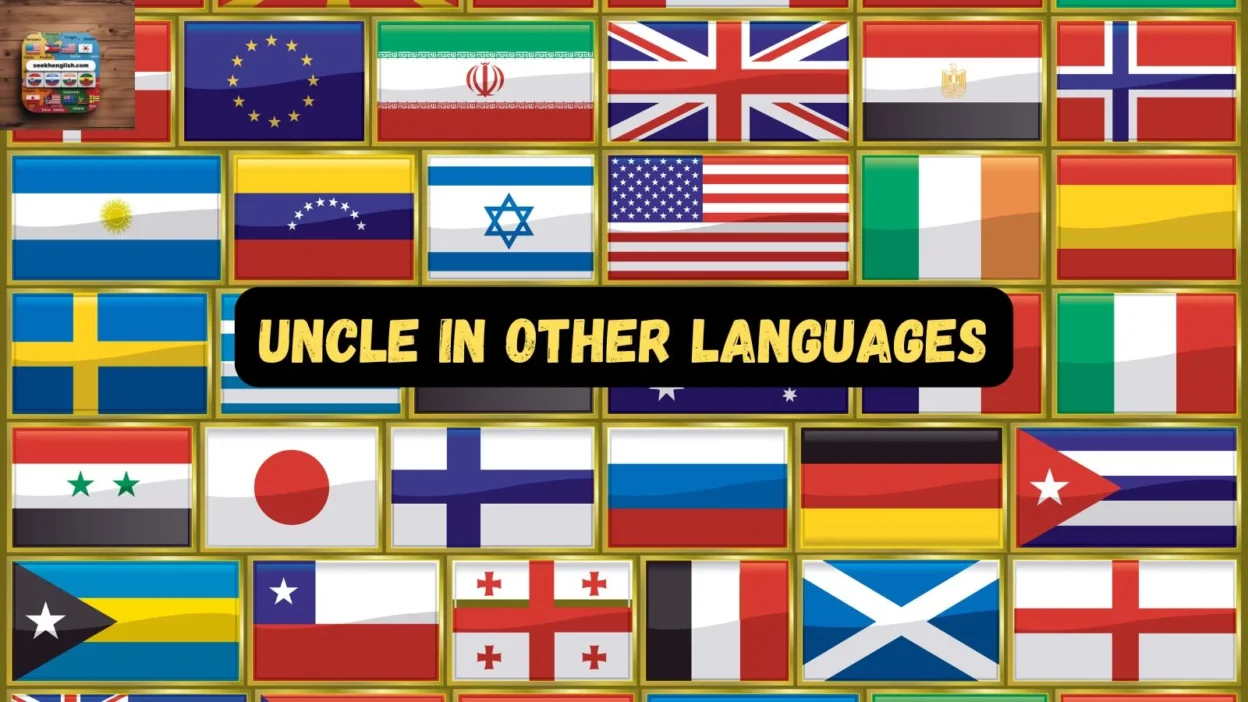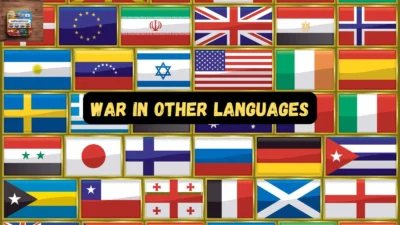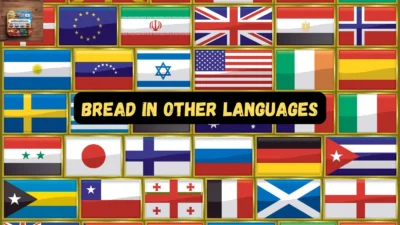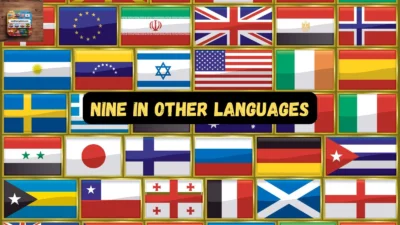The word “uncle” represents warmth, guidance, and family connection across cultures. People often search for how to say uncle in other languages to understand global family terms, connect with relatives, or learn new languages. Whether you’re exploring world languages, studying linguistics, or naming a fictional character, this list will help you express Uncle in Other Languages with pronunciation and example sentences.
This article will teach you the meaning and use of the word uncle, so you can easily use it while talking to anyone around the world.
How to Say “Uncle” in 650 Different Languages
- Afrikaans (🇿🇦) – oom | Pronunciation: oom Example: My oom woon in Kaapstad. (“My uncle lives in Cape Town.”)
- Albanian (🇦🇱) – xhaxha | Pronunciation: jah-jah Example: Xhaxhai im është shumë i sjellshëm. (“My uncle is very kind.”)
- Amharic (🇪🇹) – አያት (ayat) | Pronunciation: ah-yaht Example: አያቴ በአዲስ አበባ ይኖራል። (“My uncle lives in Addis Ababa.”)
- Arabic (🇸🇦) – عم (ʿamm) | Pronunciation: am Example: عمي يعمل في المدرسة. (“My uncle works at the school.”)
- Armenian (🇦🇲) – հորեղբայր (horeghbayr) | Pronunciation: ho-rekh-bair Example: Իմ հորեղբայրը ապրում է Երեւանում։ (“My uncle lives in Yerevan.”)
- Azerbaijani (🇦🇿) – dayı | Pronunciation: da-yuh Example: Mənim dayım çox gülərüzdür. (“My uncle is very cheerful.”)
- Bangla (🇧🇩) – চাচা (chacha) | Pronunciation: cha-cha Example: আমার চাচা ঢাকায় থাকেন। (“My uncle lives in Dhaka.”)
- Basque (🇪🇸) – osaba | Pronunciation: oh-sah-bah Example: Nire osaba mendian bizi da. (“My uncle lives in the mountains.”)
- Belarusian (🇧🇾) – дзядзька (dzyadzka) | Pronunciation: jadz-ka Example: Мой дзядзька працуе ў школе. (“My uncle works at a school.”)
- Bengali (🇮🇳) – মামা (mama) | Pronunciation: maa-maa Example: আমার মামা একজন শিক্ষক। (“My uncle is a teacher.”)
- Bosnian (🇧🇦) – ujak | Pronunciation: oo-yak Example: Moj ujak živi u Sarajevu. (“My uncle lives in Sarajevo.”)
- Bulgarian (🇧🇬) – чичо (chicho) | Pronunciation: chee-cho Example: Моят чичо работи в банката. (“My uncle works in the bank.”)
- Catalan (🇪🇸) – oncle | Pronunciation: on-kle Example: El meu oncle viu a Barcelona. (“My uncle lives in Barcelona.”)
- Croatian (🇭🇷) – stric | Pronunciation: streets Example: Moj stric je liječnik. (“My uncle is a doctor.”)
- Czech (🇨🇿) – strýc | Pronunciation: streets Example: Můj strýc pracuje v Praze. (“My uncle works in Prague.”)
- Danish (🇩🇰) – onkel | Pronunciation: on-kel Example: Min onkel bor i København. (“My uncle lives in Copenhagen.”)
- Dutch (🇳🇱) – oom | Pronunciation: ohm Example: Mijn oom heeft drie kinderen. (“My uncle has three children.”)
- English (🇬🇧) – uncle | Pronunciation: uhn-kul Example: My uncle loves fishing.
- Estonian (🇪🇪) – onu | Pronunciation: oh-noo Example: Minu onu elab Tallinnas. (“My uncle lives in Tallinn.”)
- Finnish (🇫🇮) – setä | Pronunciation: seh-tah Example: Minun setäni on opettaja. (“My uncle is a teacher.”)
- French (🇫🇷) – oncle | Pronunciation: ohn-kluh Example: Mon oncle travaille à Paris. (“My uncle works in Paris.”)
- German (🇩🇪) – Onkel | Pronunciation: on-kel Example: Mein Onkel ist Ingenieur. (“My uncle is an engineer.”)
- Greek (🇬🇷) – θείος (theíos) | Pronunciation: thee-os Example: Ο θείος μου ζει στην Αθήνα. (“My uncle lives in Athens.”)
- Gujarati (🇮🇳) – કાકા (kaka) | Pronunciation: kaa-kaa Example: મારા કાકા ખેડૂત છે. (“My uncle is a farmer.”)
- Hebrew (🇮🇱) – דוד (dod) | Pronunciation: dohd Example: הדוד שלי גר בתל אביב. (“My uncle lives in Tel Aviv.”)
- Hindi (🇮🇳) – चाचा (chacha) | Pronunciation: cha-cha Example: मेरे चाचा बहुत दयालु हैं। (“My uncle is very kind.”)
- Hungarian (🇭🇺) – nagybácsi | Pronunciation: nadj-baa-chee Example: Az nagybácsim vidéken él. (“My uncle lives in the countryside.”)
- Icelandic (🇮🇸) – frændi | Pronunciation: fraen-dee Example: Minn frændi er kennari. (“My uncle is a teacher.”)
- Indonesian (🇮🇩) – paman | Pronunciation: pah-man Example: Paman saya tinggal di Jakarta. (“My uncle lives in Jakarta.”)
- Irish (🇮🇪) – uncail | Pronunciation: oon-kil Example: Tá mo uncail i mBaile Átha Cliath. (“My uncle is in Dublin.”)
- Italian (🇮🇹) – zio | Pronunciation: zee-oh Example: Mio zio cucina bene. (“My uncle cooks well.”)
- Japanese (🇯🇵) – 叔父 (oji) | Pronunciation: oh-jee Example: 私のおじは東京に住んでいます。 (“My uncle lives in Tokyo.”)
- Javanese (🇮🇩) – paman | Pronunciation: pah-man Example: Paman kula kerja ing pasar. (“My uncle works in the market.”)
- Kannada (🇮🇳) – ಚಿಕ್ಕಪ್ಪ (chikkappa) | Pronunciation: chik-kah-pah Example: ನನ್ನ ಚಿಕ್ಕಪ್ಪ ವೈದ್ಯರು. (“My uncle is a doctor.”)
- Kazakh (🇰🇿) – көке (koke) | Pronunciation: koh-keh Example: Менің көкем ауылда тұрады. (“My uncle lives in the village.”)
- Khmer (🇰🇭) – ពូ (puu) | Pronunciation: poo Example: ពូ របស់ខ្ញុំរស់នៅភ្នំពេញ។ (“My uncle lives in Phnom Penh.”)
- Kinyarwanda (🇷🇼) – data wacu | Pronunciation: da-ta wah-choo Example: Data wacu arakora mu biro. (“My uncle works in an office.”)
- Korean (🇰🇷) – 삼촌 (samchon) | Pronunciation: sam-chon Example: 내 삼촌은 서울에 살아요. (“My uncle lives in Seoul.”)
- Kurdish (🇮🇶) – mam | Pronunciation: mahm Example: Mamê min di warê de ye. (“My uncle is in the field.”)
- Lao (🇱🇦) – ອາ (a) | Pronunciation: ah Example: ອາ ຂອງຂ້ອຍຢູ່ບ້ານ. (“My uncle is at home.”)
- Latvian (🇱🇻) – onkulis | Pronunciation: on-ku-lis Example: Mans onkulis dzīvo Rīgā. (“My uncle lives in Riga.”)
- Lithuanian (🇱🇹) – dėdė | Pronunciation: day-day Example: Mano dėdė yra vairuotojas. (“My uncle is a driver.”)
- Luxembourgish (🇱🇺) – Monni | Pronunciation: mo-nee Example: Mäin Monni schafft zu Lëtzebuerg. (“My uncle works in Luxembourg.”)
- Macedonian (🇲🇰) – чичко (chichko) | Pronunciation: cheech-ko Example: Мојот чичко живее во Скопје. (“My uncle lives in Skopje.”)
- Malay (🇲🇾) – pakcik | Pronunciation: pahk-cheek Example: Pakcik saya tinggal di Kuala Lumpur. (“My uncle lives in Kuala Lumpur.”)
- Malayalam (🇮🇳) – അമ്മാവൻ (ammavan) | Pronunciation: um-mah-van Example: എന്റെ അമ്മാവൻ നല്ല ആളാണ്. (“My uncle is a good man.”)
- Maltese (🇲🇹) – ziju | Pronunciation: zee-yoo Example: Iż-ziju tiegħi jgħix f’Malta. (“My uncle lives in Malta.”)
- Maori (🇳🇿) – matua keke | Pronunciation: mah-too-ah keh-keh Example: Ko taku matua keke he kaiako. (“My uncle is a teacher.”)
- Marathi (🇮🇳) – काका (kaka) | Pronunciation: kaa-kaa Example: माझे काका पुण्यात राहतात. (“My uncle lives in Pune.”)
- Mongolian (🇲🇳) – авга (avga) | Pronunciation: av-ga Example: Миний авга хөдөө амьдардаг. (“My uncle lives in the countryside.”)
- Nepali (🇳🇵) – काका (kaka) | Pronunciation: kaa-kaa Example: मेरो काका शिक्षक हुनुहुन्छ। (“My uncle is a teacher.”)
- Norwegian (🇳🇴) – onkel | Pronunciation: on-kel Example: Min onkel bor i Oslo. (“My uncle lives in Oslo.”)
- Odia (🇮🇳) – ବାପାଙ୍କ ଭାଇ (bapanka bhai) | Pronunciation: baa-paang bhai Example: ମୋ ବାପାଙ୍କ ଭାଇ ଗାଁରେ ଅଛନ୍ତି। (“My uncle is in the village.”)
- Pashto (🇦🇫) – تره (tarah) | Pronunciation: tah-rah Example: زما تره په کلي کې ژوند کوي. (“My uncle lives in the village.”)
- Persian (🇮🇷) – عمو (amoo) | Pronunciation: ah-moo Example: عمویم در تهران زندگی میکند. (“My uncle lives in Tehran.”)
- Polish (🇵🇱) – wujek | Pronunciation: voo-yek Example: Mój wujek jest lekarzem. (“My uncle is a doctor.”)
- Portuguese (🇵🇹) – tio | Pronunciation: tee-oh Example: O meu tio mora em Lisboa. (“My uncle lives in Lisbon.”)
- Punjabi (🇮🇳) – ਚਾਚਾ (chacha) | Pronunciation: cha-cha Example: ਮੇਰਾ ਚਾਚਾ ਬਹੁਤ ਪਿਆਰਾ ਹੈ। (“My uncle is very loving.”)
- Romanian (🇷🇴) – unchi | Pronunciation: oon-kee Example: Unchiul meu locuiește la Cluj. (“My uncle lives in Cluj.”)
- Russian (🇷🇺) – дядя (dyadya) | Pronunciation: dyah-dyah Example: Мой дядя живёт в Москве. (“My uncle lives in Moscow.”)
- Samoan (🇼🇸) – uso matua | Pronunciation: oo-soo mah-too-ah Example: O lo’u uso matua e i Apia. (“My uncle is in Apia.”)
- Serbian (🇷🇸) – stric | Pronunciation: streets Example: Moj stric radi u bolnici. (“My uncle works in a hospital.”)
- Sinhala (🇱🇰) – මामा (mama) | Pronunciation: maa-maa Example: මගේ මामा ගමේ ඉන්නවා. (“My uncle lives in the village.”)
- Slovak (🇸🇰) – strýko | Pronunciation: streek-oh Example: Môj strýko býva v Bratislave. (“My uncle lives in Bratislava.”)
- Slovenian (🇸🇮) – stric | Pronunciation: streets Example: Moj stric je učitelj. (“My uncle is a teacher.”)
- Somali (🇸🇴) – adeer | Pronunciation: ah-deer Example: Adeerkay wuxuu ku nool yahay Muqdisho. (“My uncle lives in Mogadishu.”)
- Spanish (🇪🇸) – tío | Pronunciation: tee-oh Example: Mi tío vive en Madrid. (“My uncle lives in Madrid.”)
- Sundanese (🇮🇩) – uwa | Pronunciation: oo-wah Example: Uwa abdi cicing di Bandung. (“My uncle lives in Bandung.”)
- Swahili (🇰🇪) – mjomba | Pronunciation: m-jom-bah Example: Mjomba wangu anaishi Nairobi. (“My uncle lives in Nairobi.”)
- Swedish (🇸🇪) – farbror | Pronunciation: far-broor Example: Min farbror jobbar i Stockholm. (“My uncle works in Stockholm.”)
- Tagalog (🇵🇭) – tito | Pronunciation: tee-toh Example: Si Tito ko ay mabait. (“My uncle is kind.”)
- Tamil (🇮🇳) – மாமா (maamaa) | Pronunciation: maa-maa Example: என் மாமா ஒரு ஆசிரியர். (“My uncle is a teacher.”)
- Telugu (🇮🇳) – మామ (maama) | Pronunciation: maa-maa Example: నా మామ హైదరాబాద్ లో ఉంటాడు. (“My uncle lives in Hyderabad.”)
- Thai (🇹🇭) – ลุง (lung) | Pronunciation: loong Example: ลุง ของฉันอยู่ที่กรุงเทพฯ (“My uncle lives in Bangkok.”)
- Turkish (🇹🇷) – amca | Pronunciation: ahm-jah Example: Benim amcam Ankara’da yaşıyor. (“My uncle lives in Ankara.”)
- Turkmen (🇹🇲) – daýy | Pronunciation: da-ee Example: Meniň daýym mugallymdyr. (“My uncle is a teacher.”)
- Ukrainian (🇺🇦) – дядько (dyadko) | Pronunciation: dyad-ko Example: Мій дядько мешкає у Львові. (“My uncle lives in Lviv.”)
- Urdu (🇵🇰) – چچا (chacha) | Pronunciation: cha-cha Example: میرا چچا لاہور میں رہتا ہے۔ (“My uncle lives in Lahore.”)
- Uzbek (🇺🇿) – togʻa | Pronunciation: to-ga Example: Mening tog’am Toshkentda yashaydi. (“My uncle lives in Tashkent.”)
- Vietnamese (🇻🇳) – chú | Pronunciation: choo Example: Chú tôi sống ở Hà Nội. (“My uncle lives in Hanoi.”)
- Welsh (🇬🇧) – ewythr | Pronunciation: eh-with-er Example: Fy ewythr yw athro. (“My uncle is a teacher.”)
- Xhosa (🇿🇦) – malume | Pronunciation: mah-loo-meh Example: Malume wam uhlala eKapa. (“My uncle lives in Cape Town.”)
- Yiddish (🇮🇱) – פערד (feter) | Pronunciation: fe-ter Example: מײַן פֿעטער לעבט אין ניו יארק. (“My uncle lives in New York.”)
- Yoruba (🇳🇬) – baba kekere | Pronunciation: bah-bah keh-keh-reh Example: Baba kekere mi wa ni Lagos. (“My uncle is in Lagos.”)
- Zulu (🇿🇦) – malume | Pronunciation: mah-loo-meh Example: Malume wami useDurban. (“My uncle lives in Durban.”)
Conclusion
No matter where you go in the world, the word “uncle” always carries love, warmth, and family respect.



